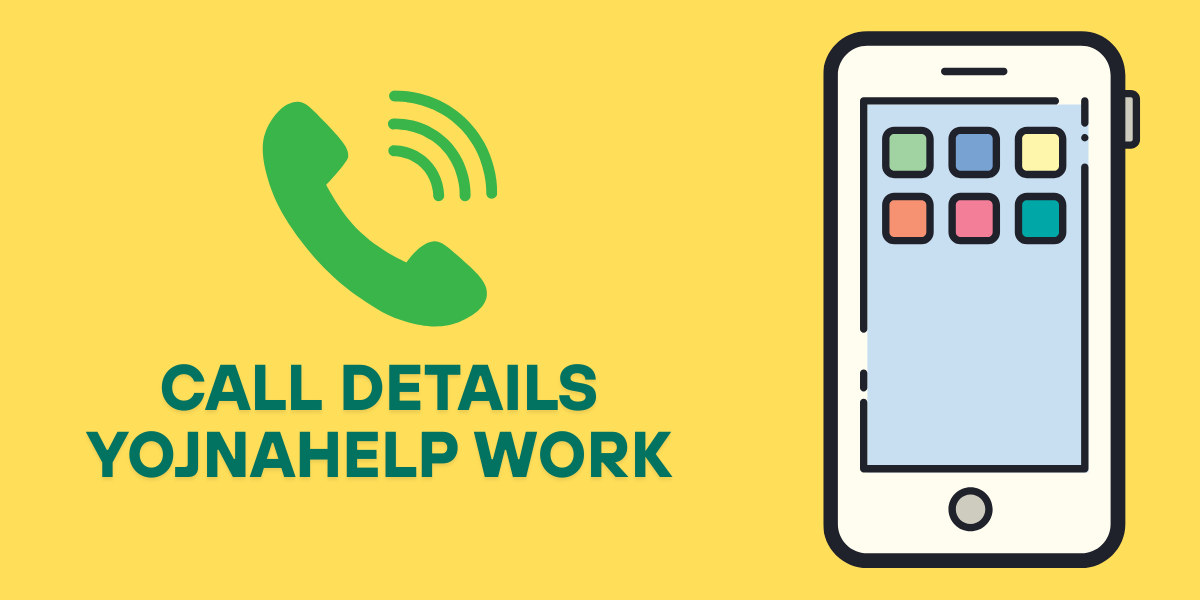The term Call Details YojnaHelp has gained attention due to the increasing demand for services that provide call record tracking. As people seek to access their mobile call histories for various purposes, YojnaHelp claims to provide information on call logs, messages, and even location data associated with specific mobile numbers. However, before delving into the features and potential applications of Call Details YojnaHelp, it’s essential to understand how these services work, the legalities involved, and the potential risks of using them.
In this guide, we’ll explore what Call Details YojnaHelp is, how it works, its legitimacy, and why individuals are increasingly interested in accessing call details.
What is Call Details YojnaHelp?
Call Details YojnaHelp refers to an online platform or service that claims to help individuals access call records or detailed information about a specific mobile number. Generally, these services are promoted as convenient tools for retrieving call histories, SMS details, or even location data for purposes such as personal record-keeping, monitoring family members, or maintaining safety. Call Details YojnaHelp aims to provide users with quick access to mobile data by entering the mobile number, with information on call duration, contact names, timestamps, and more.
However, it is crucial to note that accessing another person’s call details without their consent can infringe on privacy rights and may be illegal. Due to privacy regulations and telecom laws, call records are typically accessible only to the mobile service provider and the registered user of the number.
Why Are People Interested in Call Details YojnaHelp?
The demand for call detail services has grown for several reasons:
- Tracking Lost or Misplaced Phones: Individuals who have misplaced their phones may want to track call records to identify the last numbers contacted.
- Personal Safety and Monitoring: Some people use call detail services to monitor family members, particularly teenagers, for their safety.
- Tracking Suspicious Activity: In cases where individuals suspect fraudulent or suspicious activity, they may want to view call details to investigate further.
- Data Records for Business Purposes: Professionals who need to maintain call logs for business reasons may use such services for easy record-keeping.
While these needs are valid, obtaining someone else’s call records without their permission may have legal consequences. Let’s take a closer look at how Call Details YojnaHelp claims to work.
How Does Call Details YojnaHelp Work?

The Call Details YojnaHelp service allegedly works by entering a mobile number on their portal and then retrieving call-related information. Below is a general overview of the claimed process, though its legality and efficacy are debatable.
1. Accessing the Portal
- Users access the YojnaHelp portal, which typically presents itself as a simple website with an interface for inputting phone numbers.
2. Entering the Mobile Number
- The user enters the specific mobile number for which they want the call details and proceeds to submit the request.
3. Fetching Call Details
- After submitting the number, the portal allegedly retrieves information such as recent call logs, timestamps, duration, and contact details.
4. Data Access and Download
- Once the call details are ready, users can view or download the data in PDF or Excel format for their reference.
It is essential to emphasize that accessing call records through a third-party service without authorization from the mobile user or service provider raises significant privacy concerns. Typically, legal access to such information requires either user consent or legal authorization.
Legalities and Privacy Concerns with Call Details YojnaHelp
The provision of call records by third-party services is legally questionable in many regions. Telecommunications companies in India and most other countries have strict policies regarding data privacy and user information. Here are some of the main legal considerations regarding call detail services:
- Telecom Privacy Regulations: Accessing personal call records without consent violates telecom privacy policies in most countries. Telecom providers are bound by law to protect user data.
- User Consent: Legally, the only way to access someone else’s call details is with their explicit consent or a valid court order.
- Risks of Data Misuse: Using unauthorized services for call records can lead to potential misuse, including fraud and identity theft.
- Penalties for Unauthorized Access: Unauthorized access to call details may result in fines, legal consequences, or other penalties depending on regional laws.
Alternative Legal Ways to Access Call Details
Instead of relying on unauthorized third-party services like YojnaHelp, consider the following legal ways to obtain call records:
1. Using Mobile Carrier’s Online Portal or App
- Most telecom providers offer online portals or apps where users can log in and access their own call records, typically covering a period of up to three to six months. Airtel, Jio, and Vodafone in India, for instance, provide detailed billing and call history.
2. Requesting Call Records via Customer Service
- Users can contact customer service to request a detailed bill that includes call records. Telecom providers may offer this information for a specific period, often for a nominal fee.
3. Obtaining Legal Authorization
- In situations where legal access to another person’s call records is required (e.g., for law enforcement or investigative purposes), a court order can be obtained. Legal professionals or law enforcement officials usually handle this process.
Potential Risks of Using Call Details YojnaHelp
Using unauthorized services for call tracking, such as YojnaHelp, carries several risks:
- Legal Action: Unauthorized access to someone’s call records can lead to legal repercussions.
- Privacy Infringement: Using third-party services to access call records without consent infringes on privacy and could harm relationships.
- Data Security Issues: Third-party platforms may not be secure, potentially leading to data theft or misuse.
- Financial Scams: Some websites claiming to offer call detail services may be scams that request payment without delivering services.
Tips for Protecting Your Call Details and Privacy
Given the risks associated with third-party call detail services, here are some practical tips to safeguard your mobile privacy:
- Avoid Sharing SIM Card Information: Never share sensitive information like your SIM card details, OTPs, or passwords with anyone.
- Monitor Telecom Account Regularly: Keep track of your account on your telecom provider’s official website or app to spot any unusual activity.
- Enable Multi-Factor Authentication: Use additional layers of security, like multi-factor authentication, on your mobile accounts to prevent unauthorized access.
- Beware of Phishing Scams: Be cautious of links or messages claiming to offer call details or other sensitive information, as these could be phishing attempts.
Conclusion
While the idea of accessing call records through services like Call Details YojnaHelp may appeal to those seeking to track their calls or monitor activity, it’s important to approach such services cautiously. Unauthorized access to call records is not only a potential invasion of privacy but also carries legal implications. Fortunately, there are legitimate ways to obtain your call history, such as through official telecom provider platforms and customer service, which ensure that your data remains secure.
Read More Blogs Click Here

